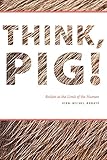Think, Pig! : Beckett at the Limit of the Human / Jean-Michel Rabaté.
Material type: TextPublisher: New York, NY : Fordham University Press, [2016]Copyright date: ©2016Description: 1 online resource (248 p.)Content type:
TextPublisher: New York, NY : Fordham University Press, [2016]Copyright date: ©2016Description: 1 online resource (248 p.)Content type: - 9780823270866
- 9780823270880
- Literature -- Philosophy
- Literature--Philosophy
- Theater -- Philosophy
- Literary Studies
- Philosophy & Theory
- LITERARY CRITICISM / Modern / 20th Century
- Animal Studies
- Comparative Studies of Bilingual Authors
- ethical approaches to literature
- literature and philosophy
- modernism
- post-modernism
- theories of comedy
- theories of the posthuman
- 848/.91409 23
- PR6003.E282 Z7886 2016
- online - DeGruyter
- Issued also in print.
| Item type | Current library | Call number | URL | Status | Notes | Barcode | |
|---|---|---|---|---|---|---|---|
 eBook
eBook
|
Biblioteca "Angelicum" Pont. Univ. S.Tommaso d'Aquino Nuvola online | online - DeGruyter (Browse shelf(Opens below)) | Online access | Not for loan (Accesso limitato) | Accesso per gli utenti autorizzati / Access for authorized users | (dgr)9780823270880 |
Browsing Biblioteca "Angelicum" Pont. Univ. S.Tommaso d'Aquino shelves, Shelving location: Nuvola online Close shelf browser (Hides shelf browser)

|

|

|

|

|

|

|
||
| online - DeGruyter The Alchemy of Empire : Abject Materials and the Technologies of Colonialism / | online - DeGruyter On Being and Cognition : Ordinatio 1.3 / | online - DeGruyter Celebricities : Media Culture and the Phenomenology of Gadget Commodity Life / | online - DeGruyter Think, Pig! : Beckett at the Limit of the Human / | online - DeGruyter The Common Growl : Toward a Poetics of Precarious Community / | online - DeGruyter The Death of the Book : Modernist Novels and the Time of Reading / | online - DeGruyter Constellations of a Contemporary Romanticism / |
Frontmatter -- Contents -- Introduction -- 1. How to Think Like a Pig -- 2. The Worth and Girth of an Italian Hoagie -- 3. The Posthuman, or the Humility of the Earth -- 4. Burned Toasts and Boiled Lobsters -- 5. "Porca Madonna!": Moving Descartes toward Geulincx and Proust -- 6. From an Aesthetics of Nonrelation to an Ethics of Negation -- 7. Beckett's Kantian Critiques -- 8. Dialectics of Enlittlement -- 9. Bathetic Jokes, Animal Slapstick, and Ethical Laughter -- 10. Strength to Deny: Beckett between Adorno and Badiou -- 11. Lessons in Pigsty Latin: The Duty to Speak -- 12. An Irish Paris Peasant -- 13. The Morality of Form-A French Story -- Coda: Minima Beckettiana -- Acknowledgments -- Notes -- Index
restricted access online access with authorization star
http://purl.org/coar/access_right/c_16ec
This book examines Samuel Beckett's unique lesson in courage in the wake of humanism's postwar crisis-the courage to go on living even after experiencing life as a series of catastrophes.Rabaté, a former president of the Samuel Beckett Society and a leading scholar of modernism, explores the whole range of Beckett's plays, novels, and essays. He places Beckett in a vital philosophical conversation that runs from Bataille to Adorno, from Kant and Sade to Badiou. At the same time, he stresses Beckett's inimitable sense of metaphysical comedy.Foregrounding Beckett's decision to write in French, Rabaté inscribes him in a continental context marked by a "writing degree zero" while showing the prescience and ethical import of Beckett's tendency to subvert the "human" through the theme of the animal. Beckett's "declaration of inhuman rights," he argues, offers the funniest mode of expression available to us today.
Issued also in print.
Mode of access: Internet via World Wide Web.
In English.
Description based on online resource; title from PDF title page (publisher's Web site, viewed 02. Mrz 2022)


